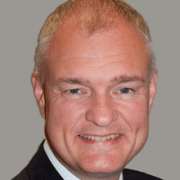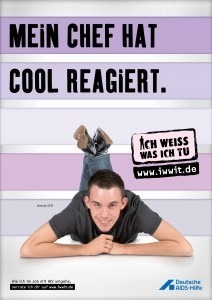Lothar Stilleke, 53, is head of the Job Centre of the City of Essen and responsible for the service team in which the then 21-year-old Marcel worked. He is very open about his HIV infection - even as a Role model of our campaign ICH WEISS WAS ICH TU. Peter Rehberg spoke to the boss about Marcel's positive coming out and the reactions in the team at the time.
Mr Stilleke, Marcel Dams has been working for you since 2009. Did you know he was gay from the start?

No. There were rumours, we talked about it briefly during the lunch break. Marcel wasn't reticent about it either, so it was pretty clear. He wasn't the only one either.
How many of your employees are gay?
(laughs) No idea. Probably about the same as the average for the normal population. We're not a hairdressing salon.
How did you find out that Marcel was HIV-positive?
Marcel came out in a team meeting: "I have to tell you something now, I'm HIV-positive". He also dropped the odd hint in advance that he'd had a test. Then he took the step.
How did the team react?
Of course, we were initially shocked and a little perplexed. It's always the case that everyone can be tolerant as long as they are not directly affected. But when it becomes concrete - and I think that's also human - you do have fears and reservations. People also have information deficits because they suppress things when they are not directly affected.
And how did the managers deal with this situation?
Marcel's team leader informed me immediately and we thought together about what to do. The works council was informed and I spoke to the management. We realised that we had to do something quickly and ideally bring in professionals. Then we got in touch with AIDS-Hilfe Essen.

The idea didn't come from Marcel?
No, he just made it public. Together with the team leaders and the management, we came up with the idea of bringing in professionals who could answer questions and allay fears. I also addressed this very openly in the service centre at the time and shook Marcel's hand in front of everyone. At a time like that, you want to say: now just get on with things as normal.
Shaking his hand at that moment - was that an intuitive reaction?
The topic was somehow bubbling up among the staff. I then went up there and greeted Marcel with a handshake. I thought to myself, you have to do that now to show him some kind of appreciation and show that he is still a normal employee. I wanted to show that to everyone else too, to allay any fears of contact.
What does "bubbling" mean - how did it manifest itself?
One or two people said: "I don't know what to do now. Can we actually still make coffee with the same coffee machine, what do we do with the toilet if he was there before me, can I still go there?" And then we organised this event with the AIDS service organisation.
How did it go?
First of all, it was about the HI virus in general, i.e. the fact that Marcel does not have AIDS, but only has the virus in him, and then about infection routes and these general things. In the second part, there was room for questions from the team, and there were really a lot of them. This famous story: If a mosquito bites him and then lands on me... But the questions were answered really well.
Was this also new to you personally, or were you already informed?
Everyone is somehow informed, but not quite right. It's also good to hear from professionals that there really is no danger. Then you can have confidence.
Have you ever been confronted with HIV before in your professional career?
Yes, with a customer. I had previously counselled people who wanted to further their education. There was one who already had Aids. But that was a long time ago and the medication wasn't that good yet. People were still very limited.
Did your current employer, the city of Essen, ever give you any training, or were you approached about the topic through trade union contacts, for example?
We are already informed about one thing or another by health management, the seasonal flu jab, swine flu, but I can't remember anything about Aids.
Did every employee feel comfortable talking about HIV in the group?
I thought it was quite open because there were a lot of questions. There were over 20 of us, and even our managing director at the time didn't miss the opportunity to be there. But there were also one or two people who expressed non-verbally that they wanted nothing to do with it.

We know that the medication works very well for most infected people, but employers are still concerned that HIV-positive people might be less resilient. Was that an issue for you?
That wasn't an issue because it hasn't got that far yet. Maybe it will become an issue one day, I can't say. It's the same reservations as against pregnant women or people with shearing disabilities. But I think people are actually educated enough to be able to deal with it.
The way Marcel's infection was handled in your company was exemplary. Does this have something to do with education, or rather with the fact that this is a specific person who you already know as a colleague?
Less clarification, more on a personal level, quite clearly. The fact that he did it openly and that people knew him made it a completely different story. That's why I say: I think it's good to be open about these things too. Then you can think together about what to do. And even if Marcel should have more serious health problems at some point, we'll see that we can utilise him in the way that he can.









